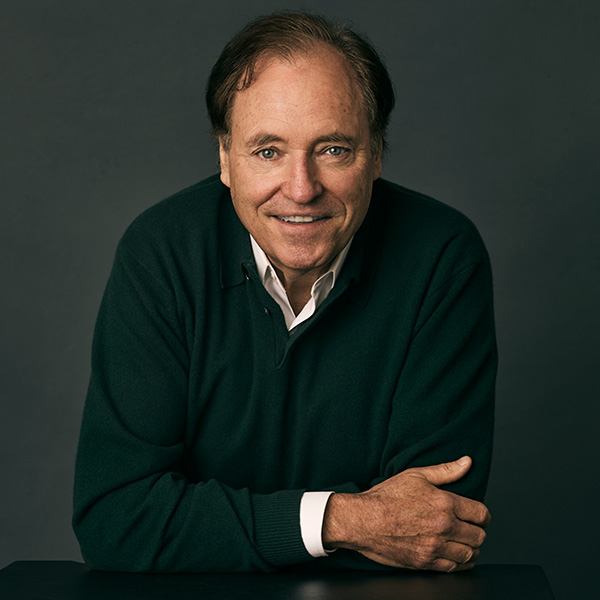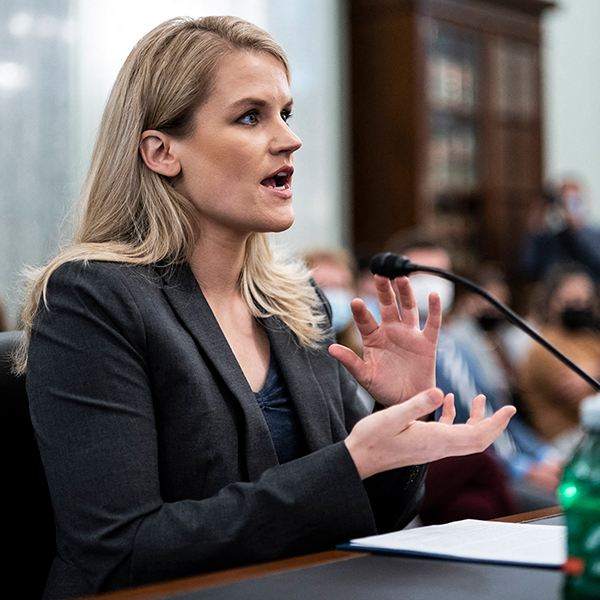At the Faculty of Law’s Skit Night in 2010, where Daniel Jutras, then the Faculty’s new dean, got roasted by his colleagues, law professor and intellectual property specialist David Lametti, BCL’89, LLB’89, revealed his post-punk grunge side, stretching the limits of copyright.
Wearing not-designer jeans and a CBGB T-shirt, Lametti belted out a rollicking parody of the R.E.M. song, “It’s the end of the world as we know it.”
His performance of “It’s the end of the law as we know it” was a gentle ribbing of the new dean, with mentions of other McGill law professors, including Geneviève Saumier, BCom’87, BCL’91, LLB’91, Lametti’s wife.
Skit Night offers an opportunity for the members of the Faculty of Law to put aside their tweed and have some fun (Jutras took the stage later that night with an acoustic guitar to perform a Kings of Leon song), but the CBGB shirt wasn’t just a prop for Lametti. As he made clear in an interview with The Montreal Gazette’s Brendan Kelly earlier this year, Canada’s new justice minister and attorney general is a big fan of punk rock and knows his Buzzcocks from his Sex Pistols.
Pierre-Emmanuel Moyse, the director of McGill’s Centre for Intellectual Property Policy (CIPP), and a friend and former jogging partner of Lametti’s, describes his fellow law professor as being “very generous with people” and someone who is genuinely interested in others’ points of view – whether that other person is a junior colleague or a top thinker in the field.
Lametti was one of the CIPP’s co-founders. Intellectual Property is a hot area of law defining the economy of ideas that has superseded the manufacturing of things, and while he stresses the importance of copyright, especially for business startups, Lametti is open to a certain degree of creative copying.
“It is critically important to the creative process that copyright not be hermetically sealed,” he says in a telephone interview.
Recalling that Vincent Van Gogh made his own versions of Jean-François Millet’s paintings –just as Lametti once riffed on that R.E.M. tune – he says, “Van Gogh would have been a plagiarist” if copyright had been absolutely airtight.
“We would have no rap music, no appropriation in art and no internet as we know it,” Lametti says.
His interest in intellectual property law began while doing his undergraduate studies in political science and economics at the University of Toronto. There he read economic historian Karl Polanyi’s The Great Transformation, setting out the rise of market capitalism and the inadequacy of relying on markets alone in organizing society.
A life-long Habs fan, Lametti came to McGill to study law with the goal of perfecting his French. Rod Macdonald, then the dean, became an important mentor.
“He was an outstanding teacher. He was innovative at a time when people weren’t necessarily innovative in terms of their pedagogy and he was also just brilliant,” says Lametti. “Rod Macdonald and others were trying to force us to think in other ways about law.”
As a McGill student, Lametti was president of the Law Students Association and executive editor of the McGill Law Journal. He was catcher for the Law Jays intramural softball team and goalie for the ball-hockey Law Leafs.
He did a master’s degree at Yale Law School, then pursued a PhD at Oxford. He co-captained the Oxford Blues hockey team with Mark Carney, now governor of the Bank of England. The squad was composed of “mainly Canadians and a few Americans and a couple of Brits. We would joke that nobody in the room had an accent, except for the English guys.”
While doing his McGill law degree, Lametti took political philosophy courses with Charles Taylor, BA’52, and James Tully. “And so by the time I got to Oxford, I was thinking about not only individual rights but communitarian responses,” he says. That meant, “looking at private property not just as a means through which individuals claim individual rights, but a way in which property owners also have obligations to the collective.
“And then the step there from property to intellectual property is not a difficult one.”
Lametti eventually became a McGill law professor himself and was happy in that role. But as the 2015 federal election approached, he decided to run for office. He was no fan of Stephen Harper’s Conservative government.
“Being a prof at McGill was a great life and for someone who came from an immigrant background, where my parents had no formal education, it was a dream and I loved it,” he says.
Lametti felt the call of active politics, reasoning, “If people don’t step up, we won’t be able to remove this government.” He ran as a rookie Liberal candidate in the Montreal riding of LaSalle-Émard-Verdun and won. He served in the government as parliamentary secretary for international trade between December 2015 and January 2017, and then as parliamentary secretary to the minister of innovation, science and economic development from January 2017 to January 2019.
In January, he received a promotion that would have been highly coveted under ordinary circumstances, when he became Canada’s new justice minister and attorney general. Within weeks, though, that job became complicated in ways that Lametti likely could never have anticipated.
His predecessor, Jody Wilson-Raybould, accused Prime Minister Justin Trudeau, BA’94, and others of subjecting her to inappropriate pressure in her role as attorney general, trying to get her to intervene in a court case against SNC-Lavalin. The resulting controversy has done damage to the government and its hopes for re-election.
Lametti has been choosing his words carefully when it comes to the matter of SNC-Lavalin. As attorney general, he wants to avoid having any impact on the court case and possible appeals. When recently asked by reporters if the prime minister has tried to influence his approach to the case, Lametti responded, “The prime minister has never tried to direct me. If someone else tries to direct me then they’ll hear about it.”
After he completed his law studies at McGill, Lametti began working with someone who, like Rod Macdonald, would be an instrumental role model. He became a clerk to Supreme Court of Canada Justice Peter Cory, an experience Lametti describes as “intense.
“It gave me really good work habits,” he says.
“Justice Cory expected that [his clerks] would think critically because that was the only way we would be any assistance to him. He worked harder than the rest of us,” a model Lametti says he tries to live by.
“And I realized you could be nice and succeed. And I think that is important in a world where world leaders and others don’t necessarily act kindly or nicely all the time.”


